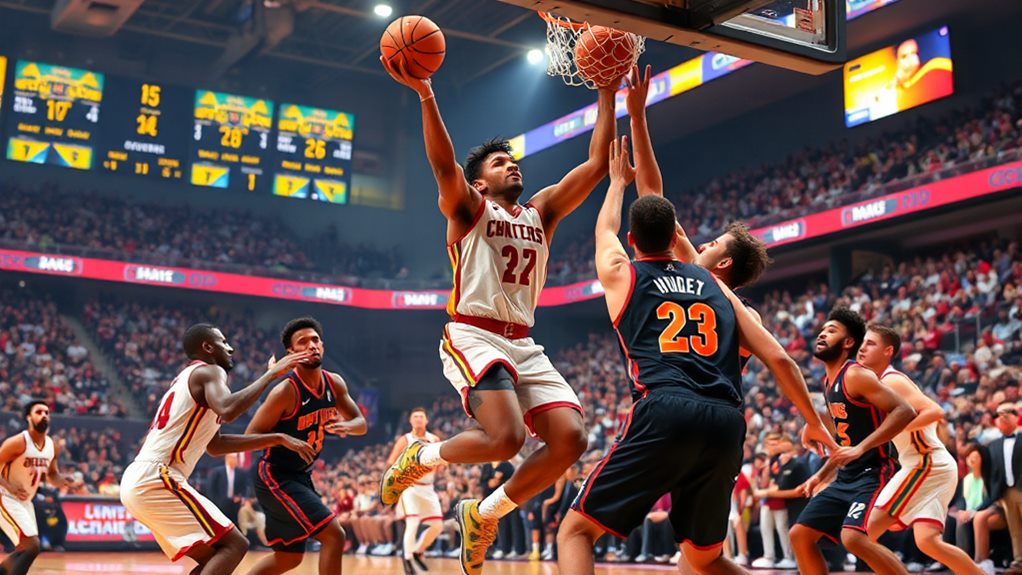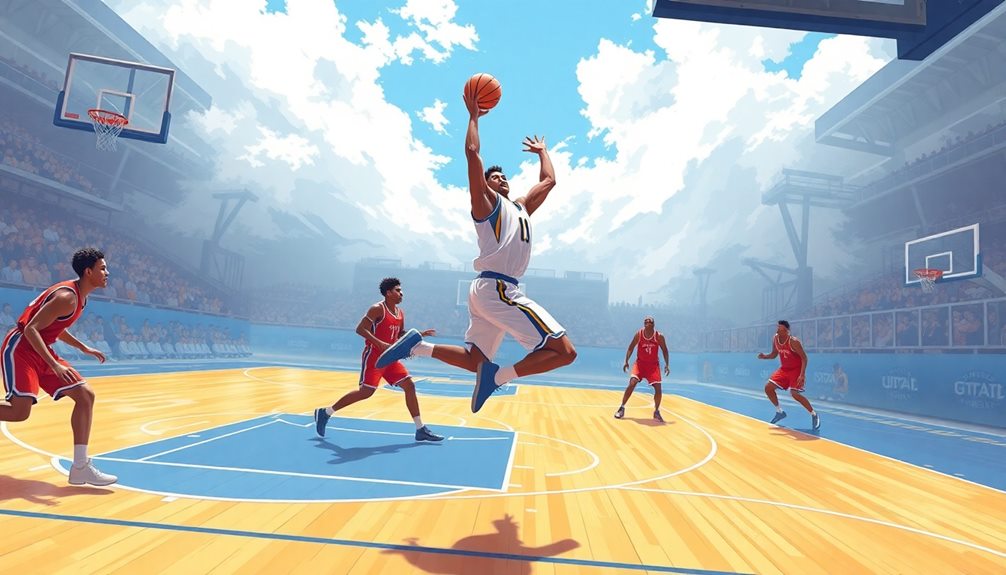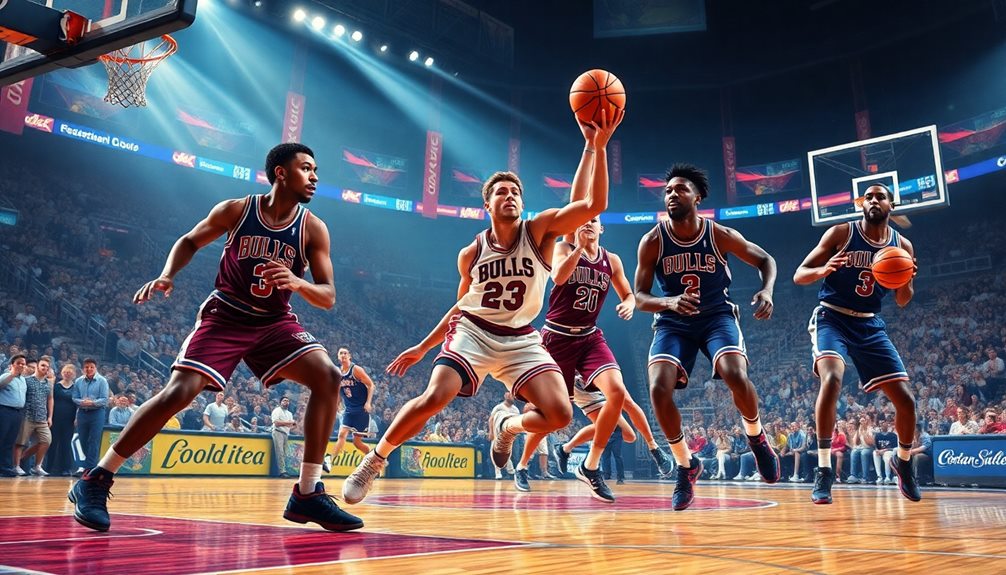
What Does a Small Forward Do in Basketball? Role and Skills
December 7, 2024As a small forward, you play a crucial role in basketball, blending scoring, rebounding, and defensive responsibilities. You're agile and athletic, able to guard multiple positions and create scoring opportunities. You'll need strong shooting skills for three-pointers and mid-range shots, plus solid ball-handling to drive through defenses. On defense, your quick lateral movement helps you contest shots and disrupt passing lanes. You adapt your scoring style to fit game situations, just like the greats have. If you're curious about the skills and players that define this position further, there's plenty more to uncover.
Definition and Role of Small Forward
The small forward, often referred to as the "three," plays an important role on the basketball court. As a versatile player, you're responsible for scoring, rebounding, and facilitating your team's offense while also contributing defensively.
Typically positioned between the shooting guard and power forward, the small forward combines agility and athleticism to guard multiple positions, making you essential for both offensive and defensive strategies. In addition to these responsibilities, small forwards can also draw inspiration from inspiration stories that highlight resilience and teamwork in the sport.
Standing between 6'6" and 6'9", you balance speed and strength, allowing you to operate effectively near the basket and on the perimeter. Your shooting ability is critical, as it enables you to stretch the floor and create scoring opportunities.
But it's not just about putting points on the board; your playmaking ability and high basketball IQ allow you to make quick decisions, assisting teammates and creating plays.
Being a small forward means you need to excel in various areas. You're expected to rebound effectively, contribute to your team's defense, and adapt to different roles as needed.
Notable basketball players like LeBron James and Larry Bird highlight the importance of this position through their scoring and defensive prowess.
Characteristics of a Successful Small Forward
Successful small forwards possess a unique blend of skills that set them apart on the court. Their athleticism is key, as you'll need to showcase speed, agility, and strength to excel in both offense and defense. Strong shooting skills are essential; mastering three-pointers and mid-range shots stretches the floor, creating scoring opportunities for yourself and teammates.
In addition, your ball-handling skills allow you to create your own shots and drive through defenses, making you a versatile offensive threat. A high basketball IQ is fundamental, too. You must make quick decisions and read the game effectively to adapt to various situations and team dynamics. To further enhance your game, consider embracing a commitment to consistent practice, as it plays an important role in refining your skills and decision-making.
On the defensive end, your defensive skills, including quick lateral movement and physical strength, enable you to guard multiple positions. This versatility is invaluable, as it contributes greatly to your team's defensive strategies.
Scoring Styles of Small Forwards

While small forwards can score in various ways, their ability to adapt their style based on the game situation makes them invaluable assets to any team. Scoring for small forwards often involves a mix of shooting, driving to the basket, and creating opportunities from three-point range.
This versatility is enhanced by advancements in basketball techniques, allowing players to refine their skills and exploit defensive matchups. Players like Kevin Durant excel as accurate shooters, stretching defenses and keeping opponents on their toes.
On the other hand, physical players such as LeBron James leverage their strength by initiating contact when driving to the basket, finishing through traffic with ease. Some small forwards specialize as slashers, effectively combining driving with shooting to create scoring chances both inside and outside the paint.
Additionally, off-ball specialists like Klay Thompson rely on their passing skills and strategic positioning for catch-and-shoot opportunities, making them dangerous with open looks.
This scoring versatility allows small forwards to exploit defensive matchups, consistently proving to be offensive threats. Whether it's through finesse or power, their diverse scoring styles guarantee they can adapt and contribute considerably to their team's success.
Defensive Skills of Small Forwards
Small forwards excel not only in scoring but also in their defensive capabilities, making them versatile players on both ends of the court. Their defensive skills are essential as they often guard a range of players, from perimeter threats to the tallest player in the post.
With quick lateral movement and strong defensive stances, small forwards effectively adapt to various offensive styles. By employing principles like pressure and cover, they enhance their defensive effectiveness and disrupt opponents' offensive strategies.
Utilizing their agility and length, they contest shots and disrupt passing lanes, which helps create turnovers and shift momentum. Often, small forwards seamlessly switch defensive assignments during games, showcasing their ability to handle different challenges. They may find themselves tasked with defending the opposing team's best scorer, highlighting their capability in high-pressure situations.
Moreover, their understanding of team defense strategies enhances overall defensive effectiveness. By communicating and coordinating with teammates, small forwards bolster the entire squad's defensive performance.
This adaptability and awareness make them invaluable assets, ensuring they not only contribute on offense but also play a pivotal role in stopping opponents. In short, small forwards are fundamental to both scoring and defending, embodying the essence of a well-rounded basketball player.
Notable Small Forwards in History

The small forward position has produced some of basketball's most iconic players, each leaving a lasting impact on the game.
These athletes showcase a blend of scoring ability and defensive skills, which makes them invaluable to their basketball teams. Significantly, players like LeBron James have elevated the game through their performance in critical moments, similar to the legacy of Bill Russell, who set a standard for excellence.
Here are four significant small forwards in history:
- LeBron James – Regarded as one of the greatest, he's celebrated for his versatility, exceptional scoring ability, and playmaking. He's won four NBA championships and earned four MVP awards.
- Larry Bird – A legendary figure from the 1980s, Bird was known for his incredible shooting skills and basketball IQ, leading the Boston Celtics to three championships and winning three consecutive MVP awards.
- Kevin Durant – Standing at 6'10", Durant is recognized for his scoring prowess, having won four scoring titles and two championships, along with being the NBA Finals MVP twice.
- Scottie Pippen – A critical part of the Chicago Bulls' six championships in the 1990s, Pippen excelled in defensive skills and facilitated offense alongside Michael Jordan.
Additionally, Maya Moore stands out in women's basketball, leading the Lynx to four WNBA championships, showcasing her scoring and defensive talents.
Conclusion
In the dynamic world of basketball, the small forward is like a Swiss Army knife—versatile, adaptable, and vital. They blend scoring and defense, making them pivotal to any team's success. Whether you're sinking three-pointers or locking down opponents, your role is essential. Embrace the challenge and hone your skills, as you have the power to change the game. So, step onto the court with confidence; after all, the heart of the team often beats in your hands.


